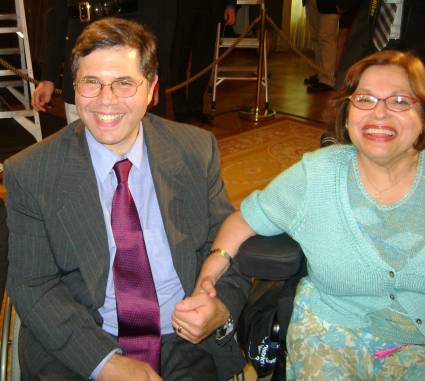Our Work
Honoring Judy Heumann
Founding mother of the U.S. disability rights movement

Judy Heumann joined HPOD's Executive Director Michael Ashley Stein at a White House ceremony in July 2009 organized on the occasion of President Obama's signing of the UN Convention on the Rights of Persons with Disabilities.
When Judy Heumann passed away on March 4th, 2023, she left behind a long legacy of disability rights activism. As HPOD's Executive Director Michael Ashley Stein recently wrote for the Harvard Law Review Blog:
Simply put, Judy Heumann was the world’s most significant disability rights champion. A force of nature, Judy was at the epicenter—if not the precipitator—of a cascade of American and international disability rights laws and policies.
Judy is widely regarded as a "founding mother" of the U.S. disability rights movement. Indeed over her decades of advocacy, she helped to found several leading organizations of this movement, including the grassroots group Disabled in Action, the Berkeley-based Center for Independent Living, and the World Institute on Disability. She was a fearsome activist, unafraid to shut down traffic in New York City after President Richard Nixon vetoed a predecessor version of the Rehabilitation Act and to occupy federal offices during a nearly month-long sit-in to force the Carter Administration to issue regulations for Section 504 of that Act. From the streets, she took her advocacy to the halls of Congress and the United Nations, when she led advocacy efforts in support of the Americans with Disabilities Act (ADA), and also participated instrumentally in the negotiation of the United Nations Convention on the Rights of Persons with Disabilities (CRPD). She also channeled her activism into significant policy-making roles: first, as the Under-Secretary of Education during the Clinton Administration, when she oversaw promulgation of regulations that invigorated the Individuals with Disabilities Education Act; then, as the World Bank’s first disability point person, where she reshaped that organization's disability-related policies; and as the Department of State’s first disability advisor in the Obama Administration, when she promoted disability inclusion in U.S. international aid programs and procurement.
A critical part of Judy's journey from a young Brooklyn girl with disability regarded as a "fire hazard" to "founding mother" was captured in the award-winning documentary Crip Camp. In the 1970s, teenagers with disabilities gathered at Camp Jened in upstate New York, a temporary refuge from the world of pervasive discrimination and isolation that they experienced in their communities. The bonds they forged at that Camp helped sustain them as the U.S. disability rights movement gained momentum. Indeed, when Judy first moved from New York to Berkeley, CA to join the nascent independent living movement, she did so with fellow camper and activist, Nanci D’Angelo.
Crip Camp not only breathed fresh life into the history of disability rights activism in the United States and helped to bring Judy's legacy home to a broader audience, but also served as a poignant reminder of the importance of taking pride in one's disability identity. Crip Camp was released during some of the darkest days of the COVID-19 pandemic, a time when the value of the lives of persons with disabilities was called into question in both blatant and subtle ways. As Professor Robyn M. Powell wrote in her remembrance of Judy for the Harvard Law Review Blog:
As scholars have posited, and Judy knew, claiming disability and being proud of that identity is necessary to radically transform society and achieve equity for disabled people. Being unapologetically proud of your disability allows someone to celebrate who they are.
In this way, Judy's life of activism was a manifestation of her deep pride in her own identity as a person with disability. Her strength as an advocate, like that of her many disability rights acolytes, was founded on the unshakeable conviction that the lives of persons with disabilities matter. And honoring her legacy is just one of many opportunities to renew our commitment to the inherent worth of all persons with disabilities, and to holding society to account for its concomitant obligation to ensure that persons with disabilities are fully included in all aspects of life.




